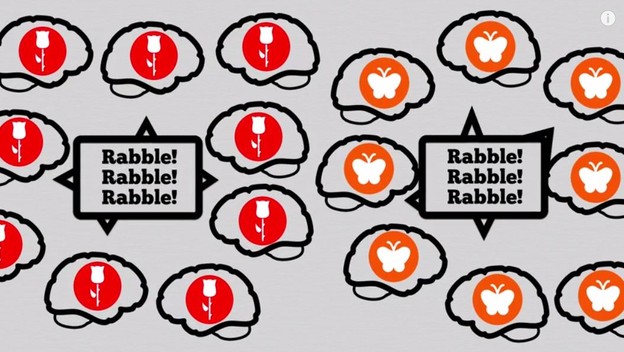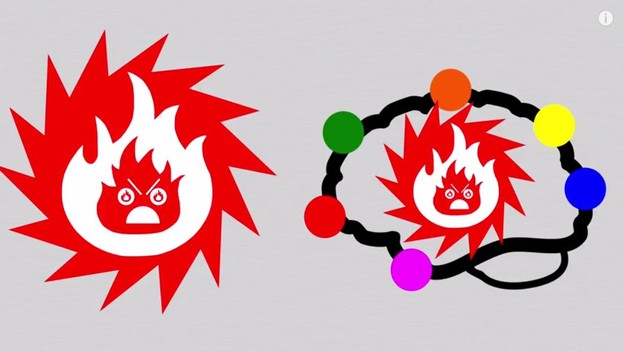I watched a particularly interesting video today by internet education wizard CGP Grey, about how thoughts are transmitted from one person to another. If this seems weird and kind of self-explanatory, in a way it is, but it’s more about thinking about this transmission of thoughts in a different way, specifically as if they were life (or germs, considering the verdict on whether or not viruses are life is still out).
You should go watch the video yourself , but for those of you who don’t have time, here is a quick rundown. Imagine every thought as a germ, and its host is a human brain. A thought without a brain to think it dies. Try to think of everything you thought of randomly while you were on the toilet, or the pictures you took randomly one day on your camera of nothing in particular. Without spreading and reinforcement, these thoughts die and no one ends up thinking about them.
So it behooves a thought to reach another brain, thus effectively reproducing. If I tell you a joke, for example, that joke has effectively made another copy of itself in your brain.
Thoughts undergo the same processes that life undergoes, including mutation and evolution. Think about image macros for a while. What starts as a simple funny picture gets remixed again and again becoming funnier and funnier (hopefully) and thus increasing its ability to infect more people.
They also spread by vectors, just like diseases, and in this analogy our vectors are emotions, or things that make us likely to receive and retransmit a thought. The most effective vector as found by mathematically mapping arguments on the internet? Anger.
But there are even more biological processes that act on these thoughts. Symbiosis occurs when two competing viewpoints continue to grow. CGP Grey says that, while it appears as if the two sides are battling to the death, they are actually helping each other. As one side grows bigger, the opposition grows angrier and bigger, and vice versa. They remix and evolve their thought germs to portray the absolute worst about the opposing side, and transmit this thought germ to new people. They are essentially a field of flowers and a flock of butterflies. If you plant more flowers, you draw more butterflies, and drawing more butterflies pollinates more flowers.
And now for the thing I really want to talk about, the insulation effect. You see, thoughts, like germs, thrive in places where their hosts are weakest. It’s very unlikely that a germ will spread and stick in a person who is immune, and similarly a thought won’t spread and stick in a person who vehemently believes the opposite of what that thought germ is stating. As a result, thoughts don’t really spread between two sides of an argument, which is really what an argument is supposed to be. In fact, two sides of an argument rarely even converse. Instead, each individual side talks about how awful the other side is amongst itself more than it talks to the other, and what does it talk about? How awful the other side is. It continues to remix and reproduce that thought germ amongst it’s own community, letting it evolve as the most infurating, not the most accurate, info gets reinforced, until it becomes the most maddening, sickening, horrendous portrayal of the opposing side possible – the perfect thought germ.
Meanwhile, actual discussion with the other side continues to reduce as this thought germ spreads around each insular side, which is hilarious as exposure to individuals who have the “thought antibodies” so to speak is actually what we need to make arguments come to a reasonable conclusion, i.e. civil discourse. But the very nature of the spread of thoughts prevents this.

So I looked at this and applied it to everyone’s favorite subject, #GamerGate, and I found that it fits the mold eerily well. Most #GamerGate supporters do not talk with anti-#GamerGate supporters and vice versa. Discourse between both sides is rare. Instead, one side characterizes the other as women hating misogynists who want nothing more than to close off gaming to anyone other than their own selfish boys club, and on the flipside, the first side is characterized as a conspiracy of corrupt SJW journalists that are in league with developers to push a political agenda and make a ton of money off click baity articles. However, whenever I see these discussions on Twitter, it’s rarely one side civilly discussing with another. Its #GamerGaters talking about how awful everyone who opposes them are, and non-#GamerGaters are doing the same, letting their anger build in insular communities. That’s how we get here, where Anita Sarkeesian is apparently the devil, and #GamerGate is apparently a terrorist organization. When I step back to think about it, both those veiwpoints seem pretty insane.
But the hilarious thing about all this is that simply by typing this article I am actually letting the mind virus spread.
This type of life-emulating behavior can be found in less politically charged arguments in the gaming world as well. If you are a Tekken player who dislikes Street Fighter , you are more likely to share your dislike of Street Fighter with your Tekken playing friends, rather than with other Street Fighter players. Soon, “I don’t like the combo system” evolves into, “What is this one hit death comeback ultra bullshit?”
And that’s the sinister thing here. By discussing this amongst ourselves, we only enable the spread of the thought germ to get further. By being a fervent anti-#GamerGate advocate, you make #GamerGate stronger, and vice versa. By spreading information about either side, the most maddening and not necessarily the most accurate information finds itself into our minds. Then, when the other side is presented with that inaccurate information, it’s most maddening conception of its opponent gets reinforced! We are all just tools in parasitic thought symbiosis.
Now none of this has anything to do with whether or not the thoughts are good, just how they spread, and how to moderate the spread of said thoughts. We can be mentally hygienic, so to speak, by limiting our exposure to random 4Chan posts and tweets that supposedly support our side, and instead, sitting down to have rational conversations with the other side. We can inoculate ourselves from rage viruses by choosing to not speak with others who agree with us about what our opponents think, and rather talk to our opponents about what they think. This goes for both sides of the argument.
And so I think back to every argument I have ever had about games, from “this character sucks” to “I hate this franchise” to “#GamerGate is destroying humanity” and I think of what a pawn my brain has been in the scheme of a parasitic thought transmission. I think, like washing our hands, if we become cautious of the thought germs that we allow into our brains, arguments about games will become more manageable and more civil. Hey, we might even enact some useful change on the world while we are at it.
Seriously, watch the video . It’s very entertaining and very informative.
